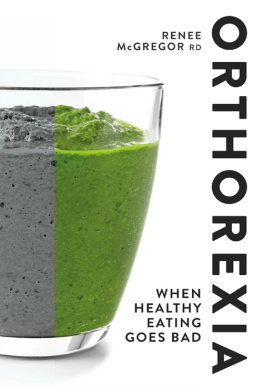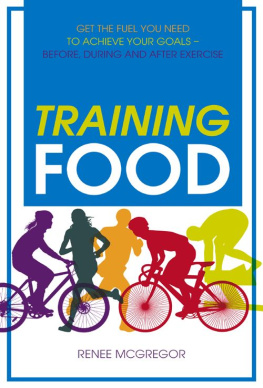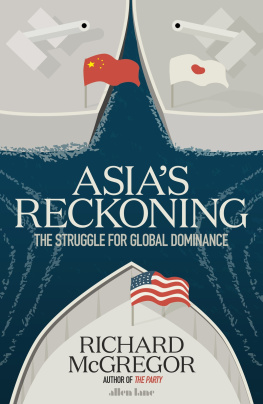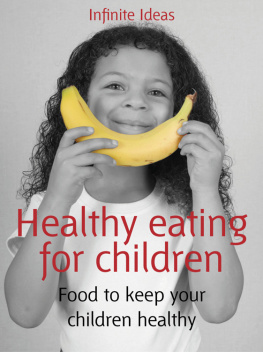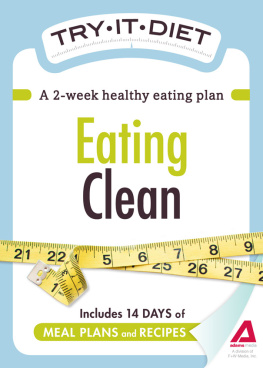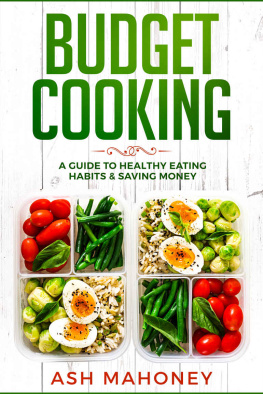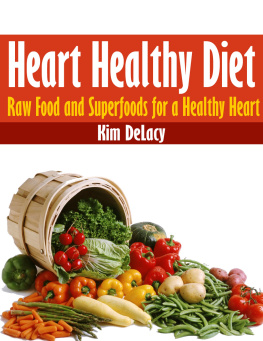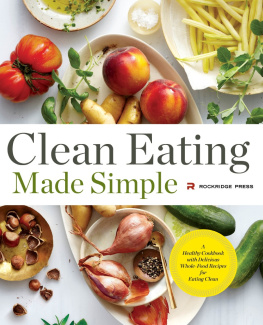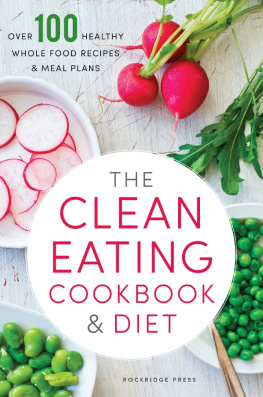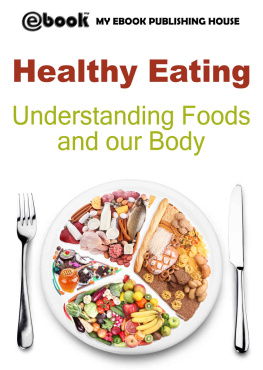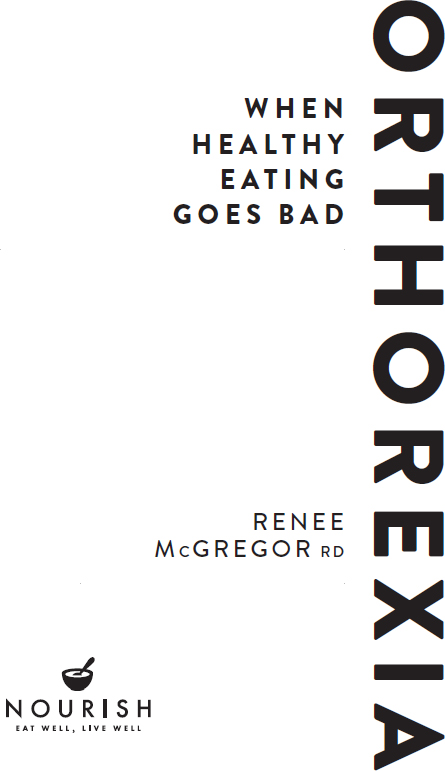ORTHOREXIA
Praise for Renee McGregors Orthorexia
Renees book provides a truly excellent description of orthorexia and how the search for health, if taken to excess, may lead psychological or even physical harm. Her approach is clear, nutritionally sound, and full of practical, sensible advice. I highly recommend it for anyone struggling to find the balance between healthy lifestyle and excessive restriction. Dr Steven Bratman MD
Essential reading for anyone who is concerned that their healthy lifestyle is going too far... Renee McGregor brings expertise and empathy to this important subject. This book is accessible, authoritative and packed with first-rate practical advice. Emma Woolf, An Apple a Day
This book is timely and important. I am sure that it will be an invaluable resource a lifeline for the many people affected by this poorly understood condition. But more than that, I hope that it will serve as a much needed wake up call, shining bright light upon the often damaging rhetoric of the wellness industry. Perhaps this is the intelligent and informed study that will inspire a new generation of wellness gurus to fully consider the consequences of the messages they spread.
Anthony Warner, The Angry Chef
CONTENTS
FOREWORD BY BEE WILSON
Have there ever been such complicated times in which to eat? To walk through a modern city is to be bombarded with food options of one kind and another. There is a pulse of low-level anxiety around what we put in our mouths and what it will do to our bodies, with much talk of certain things being good (avocado, say) and even more talk of others being bad (sugar). Nor are we entirely wrong to look with suspicion on the modern food supply. Never before have so many people been sickened not by undernutrition but over-nutrition, with galloping rates of Type 2 diabetes and other diet-related diseases across the globe. In our world food is everywhere, and yet has become something that we can no longer automatically count on to nourish us and keep us strong. No wonder that many of us have become confused and unhappy about the whole question of what to eat. Its tempting to believe that there is some set of perfect food rules out there that could make all our dilemmas go away.
Complicated times such as these are a gift to gurus promising easy solutions. But these solutions turn out to be less easy than they first seem. Nor are they real answers, but dangerous ideas that create a raft of fresh problems. If modern diets are lacking in vegetables then perhaps, suggest these gurus, the answer is a diet that consists of nothing but vegetables? Social media is full of wellness prophets promising us ultimate health plus glowing skin! if only we can relinquish all carbohydrates and sugars and live on such ingredients as coconut oil, kale and spiralized vegetables. Our brains are assaulted with endless mixed messages about food. It ought to be such a source of uncomplicated delight, a universal human pleasure, so it is sad that for so many people, eating itself has become instead something to feel perpetually guilty about and scared of. Anyone trying to develop a balanced relationship with food has to find their own path between the extremes.
Fear of food is a perfectly understandable response to the food environment we now inhabit, particularly for anyone who is going through other life stresses. But its also a deeply damaging and disordered mindset to get into, as Renee McGregor explains so calmly and knowledgably in this timely book. Orthorexia nervosa a disorder in which individuals fixate on correct eating to the point where they are severely restricting their intake may not be as well known as anorexia nervosa, but it can be both physically and mentally debilitating for those suffering from it. What makes orthorexia even harder to diagnose and treat is that to many in the outside world, orthorexic forms of behaviour look normal or even praise-worthy. For the past couple of years, the bestseller lists for food in Britain have been dominated by clean eating books (although many of the authors themselves have now disowned the phrase). It has become almost mainstream to suggest that the way to achieve good health is to cut out entire categories of food, ranging from bread to sugar to gluten to all carbohydrates.
What does clean eating even mean? The definitions vary depending on whos talking and what they are selling. For some Instagram gurus, clean eating is always vegan and plant based, whereas to others, it includes certain kinds of meat. But the basic idea is that there is somehow a perfectly pure way of eating which will keep you safe from harm and perhaps even guarantee you longevity. Most clean eating experts advise basing your diet on the freshest, most organic vegetables, the most cold-pressed and extra-virgin oils. This sounds good after all, most of us could stand to eat a few more vegetables and a bit less sugar but as Nigella Lawson has wisely commented, clean eating is based on a fatally flawed view of both food and of life. As Lawson wrote in 2016, Food is not dirty, the pleasures of the flesh are essential to life. We cannot control life by controlling what we eat.
I spoke to a young woman in her early twenties who said that the experience of having a meal out with friends had been ruined by our cultures love affair with clean eating. Every time she tried to order something from the menu, one or other of her friends would pass judgement on the choice, and suggest that she might opt for something better: something vegan, something lacking in wheat or dairy, something raw, something with sweet potatoes instead of ordinary potatoes. Even though she disagreed with these little interventions, and continued to order the pasta that she really wanted, she found that her enjoyment of dinner was marred. Unlike anorexia, which is generally suffered in a state of secrecy, orthorexic behaviour, as Renee McGregor notes in the book, is often flaunted in public.
For the sake of both mental health and good food, we need to fight with every bone in our bodies the idea that there is such a thing as a perfect ingredient or indeed a perfect way of eating. Enjoying a varied diet is not something we should feel guilty about, but a vital and life-enhancing part of being human. Clean eating so far from being healthy is a kind of spurious anti-food because it encourages you to ignore your senses and to be scared of nourishment.
This book is a marvellously useful and wise guide in that fight, whether you are someone who feels themselves slipping into orthorexia or whether you are concerned about a friend or family member who is displaying signs of worrying food restrictions. No one is better qualified to write about this subject than Renee McGregor, whose work as a dietitian has involved working with many eating disorder sufferers, as well as with Olympic athletes. Hers is a voice of authority and practical wisdom, an antidote to so much of the nonsense that is spouted in the name of nutrition. If you want to know why non-refined sugars are no better for you than the refined white kind or why needlessly restricting gluten is a bad idea or why many nut milks are little better than expensive water, this is the book for you. Ive never read a clearer explanation of why carbohydrates, so far from being some kind of a dietary demon, are actually a useful source of energy. But the thing I like best of all about the book is its tone of compassion. So many of us, whether we are suffering from an eating disorder or not, lack a sense of self-compassion around food, as Renee McGregor observes. Her words, which are full of psychological insights, offer encouragement to break the food rules, to eat the carbs, and yes, to be kinder to ourselves.
Next page
